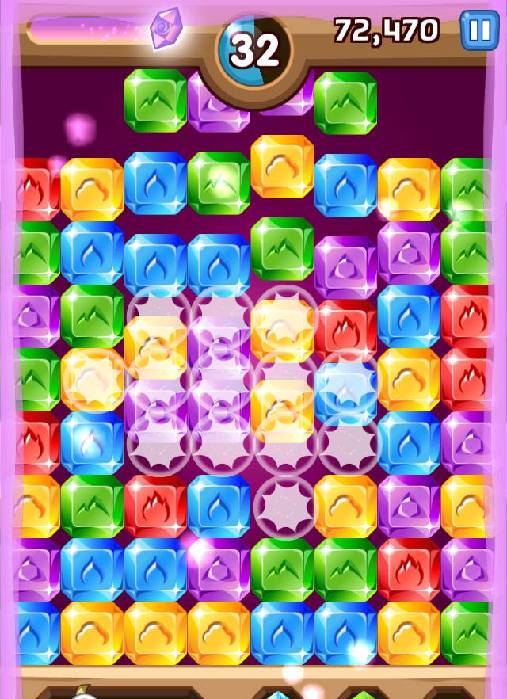Wizard game a real gem
 |
|
Gem Wizard blends the traditional casual game with the role-playing game by adding elements like weapon collecting. |
Gems, gems and more gems! Ever since the launch of Bejeweled in 2001, jewel themed matching games have become a staple of the casual gamers collection. Now throw in some elements of item crafting and hardcore collecting, and you have Pixelmatic's Gem Wizard.
Similar to every matching game out there, Gem Wizard has the player looking for three or more gems connected to each other. So long as the Gems are touching, they are touching. Links can be as small as three gems or take up the whole screen.
Like more modern versions of the match-three style game, Gem Wizard has a power up mode. Every time the player hits a series of consecutive matches, the point values are doubled. Pixelmatic chose to go phonetically with representing the addition of consecutive matches, so players hitting gem streams one after another get a feeling of making their own music.
Now moving past the already established mechanics of the genre, Gem Wizard has a collection and role-playing style element. Unlike the immensely popular puzzles and dragons, Gem Wizard has the player collecting items that craft into weapons and gems, because, well, the player is a wizard. These weapons have slots that can be filled with power providing gems. The weapons add bonuses to the overall score of the game.
Gem Wizard is a pretty good blend of the traditional simple casual game and the more "core" role-playing game because of the added crafting and weapon collecting elements.
However, that's not to say that the game is without fault. Gem Wizard's problems lie in two areas - the first is the social element and the second is its monetization format. Let's start with the latter. Gem Wizard is a free-to-play game. As a free game, the developer makes money from the game either via advertisements found in game or in-game purchases.
The issue with Gem Wizard isn't the in-app purchases at all but rather that it uses the proven system of pay-to-play. Pay-to-play is a method in which a player plays a game and after a level or a match is over the player must either wait a set amount of time to play again or pay cold hard cash to continue. This type of model is highly lucrative and popular among developers. This type of model also forces the game to always be online, meaning players must have an internet connection to play.
The next issue with Gem Wizard is that it's built around Facebook. The game was meant to be a social game where players can compare scores and show off their weapons. Unfortunately for China, Facebook is blocked and Chinese players are left out of the social element. In reality though, this is a non-issue for players anywhere else in the world.
Gem Wizard is a good casual game. It's hard to put down once the rhythm of busting gems has started, but because of its monetization system, the game forces the player to stop.






















